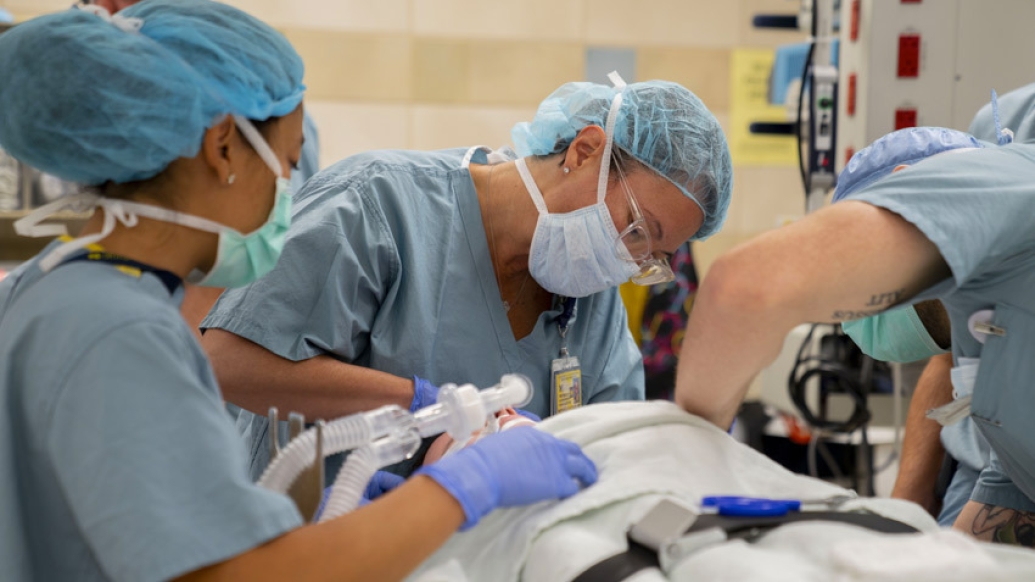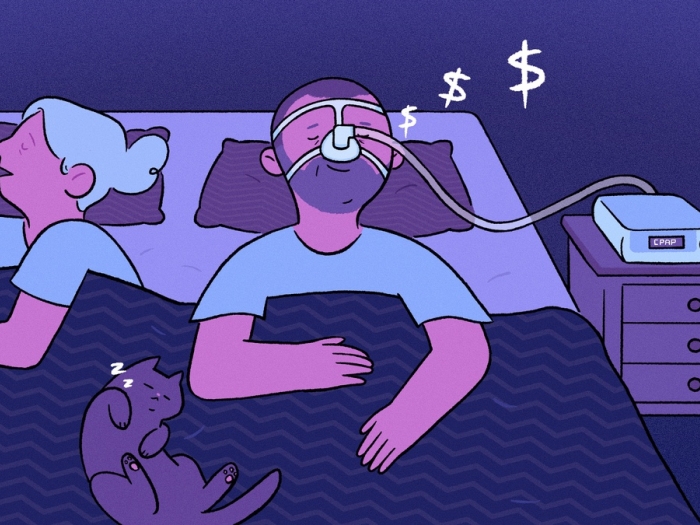Despite some progress, the highly competitive field is mostly dominated by white, male surgeons.
8:52 AM
Author |

As a child, Michelle S. Caird, M.D., spent Sundays tailing her father through the halls of Butterworth Hospital in Grand Rapids. She eagerly followed the vascular surgeon on rounds with his residents.
"I would eat dinner with him at the hospital because he was so busy, and that's when I could see him" Caird said. "I loved it. I always planned on being a surgeon."
Decades later, Caird walks the halls of C.S. Mott Children's Hospital in a white coat with her own team of residents. The third-generation surgeon is Michigan Medicine's first female chair of orthopaedic surgery.
Other than her nameplate, not much has changed for Caird since her approval by university regents on May 20. She served as the department's interim chair for the last two years.
But as one of just a handful of female orthopaedic surgery chairs in the United States, and, likely, the first Japanese-American woman to hold such a title, the weight of Caird's historic appointment is still sinking in.
Like Podcasts? Add the Michigan Medicine News Break on iTunes, Google Podcast or anywhere you listen to podcasts.
"I feel a deep sense of duty not just to this department or our school, but to all other women who are interested in the field of orthopaedic surgery," Caird said. "I had a lot of mentors who helped me overcome obstacles to get where I am, and I want to make that journey even easier for people in the future."
Caird steps into the role with the goal of expanding diversity in orthopaedics, a specialty whose homogenous history is no secret in medicine. In 2018, membership in the American Academy of Orthopaedic Surgeons was around 92% men and 86% white. When Caird applied for residency in the late 1990s, some departments indirectly told her they were not interested in female residents.
Despite increasingly diverse classes of medical students, orthopaedic surgery lags behind most primary surgical subspecialties in demographic transformation. Women in 2019-2020 made up under 16% of orthopaedic residents – and 7% of U.S. programs still have no female residents, according to current Michigan Medicine research.
SEE ALSO: Pipeline Program Offers Minority Medical Students Opportunity to Engage in Specialties
There has always been a bias about what it takes to be an orthopaedic surgeon; not just mental toughness, but also physical toughness, said Eileen A. Crawford, M.D., an assistant professor of orthopaedic surgery and associate director of the orthopaedic surgery residency program at Michigan Medicine.
"That led to a lot of people dismissing women applying to the field from the outset thinking women can't physically do the job as it's required," Crawford said. "So, multiple generations of women have had to prove they can do it, and they have to work twice as hard just to get recognized for the work their male colleagues do."
The number of minority orthopaedic residents has not changed significantly over the last 15 years, with less representation of several minority groups compared to other surgical subspecialties. As director of the residency program, Caird focused on recruiting diverse classes that better reflected the patient populations.
"Orthopaedic surgery is such a wonderful specialty that returns people to function," she said. "But there are so many people who wouldn't even consider this as a profession because it wasn't broad enough and didn't have an open reputation. The same goes for patients who may not come to see us because we don't look like or understand them. The gap exists because of us, and that's what I want to change."
... there are so many people who wouldn't even consider this as a profession because it wasn't broad enough and didn't have an open reputation.Michelle S. Caird, M.D.
While a step in the right direction, studies show recruitment efforts haven't moved the needle much when it comes to gender and racial disparities in orthopaedic residents. Looking for a multi-faceted approach, Caird started a diversity, equity and inclusion committee in the department last year.
"If people are missing mentors and other resources early on, even in high school and undergraduate years, they're already at a disadvantage that makes it much harder to get into the field in the first place," said Crawford, whom Caird tapped to lead the committee and serve as associate chair for DEI in the department. "So, we're now involved in several pipeline programs that bring together students and trainees of different levels and encourage women and underrepresented minorities to explore orthopaedics."
The committee launched as the university announced an increased focus on diversity and inclusion. In addition to pipeline programs, Crawford and the committee developed a mission statement for the department, host educational conversations on racism and discrimination, produce a monthly newsletter and fundraise for DEI programming.
"We've had great engagement in the department with people showing up to monthly Zoom meetings," Crawford said. "People are volunteering to help out in different roles, and they're vocal in terms of their thoughts and how we can do better. We're also really lucky to have someone like Dr. Caird at the helm, who makes sure it's a regular topic of conversation for the department."
The department is on its own journey, one grounded in patience and humility. All of it – the difficult conversations, setbacks and exposure of biases that cause harm – must be part of the path towards equity and improved patient care, Crawford says.
"If the diversity and inclusivity of our providers are not apparent to patients, they may feel misunderstood or dismissed and some will not seek care at all," she said. "That needs to change."
For over 20 years, that feeling of dismissal has fueled Caird's resolve to transform the field. After reaching the top position in the department, she's not slowing down.
"I have a middle school daughter," Caird said. "My greatest hope is that she can choose to be anything she wants and that she doesn't have to fight quite as hard or put up with quite as much. If we've tried and worked to make that easier for her and others like her, then we'll have been successful."

Explore a variety of healthcare news & stories by visiting the Health Lab home page for more articles.

Department of Communication at Michigan Medicine
Want top health & research news weekly? Sign up for Health Lab’s newsletters today!





